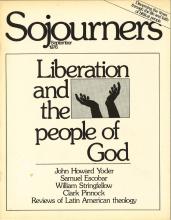If today's institutional church is to be a viable force in the age to come we must anticipate not minor modifications but radical change, change in existing institutional structures which condition the nature of the church's life and also in corporate attitudes which shape its mission.
As we all know, the church as institution is not the only meaning to be conveyed by the New Testament word for church, nor is it its principal meaning. Primarily, the word has reference to a people, a community, a gathering. It means not just a lumping together of individuals, but rather a corporate phenomenon -- the people of God. It means a people with a personal and ideological identity common to themselves and to no others: a peculiar people who uniquely belong to God, and for whom this "belonging" is a reference point for making sense out of their very being.
The New Testament provides us with nothing definitive concerning outward shape or institutional forms for the church. I realize this comment flies in the face of sincere attempts presently being made to return to the New Testament church. It is an obvious historic fact that by the third generation all such attempts have produced a church looking very much like the churches they were attempting to escape from, perhaps because in the absence of a useful new model, old ones were unconsciously used in the end.
Read the Full Article
